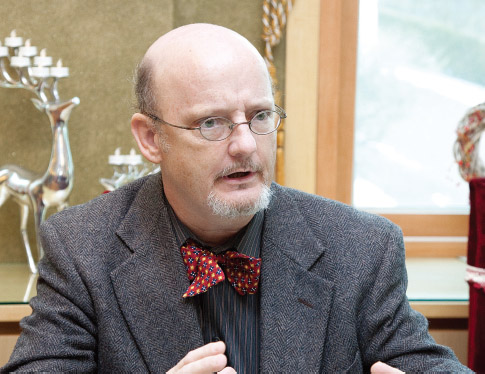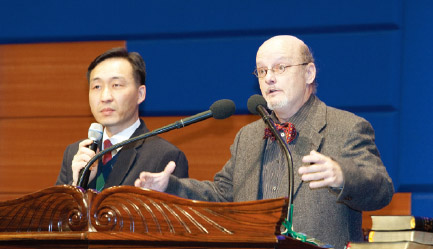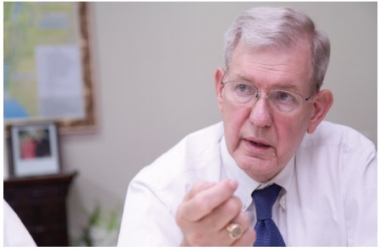Dr. Samuel Lamerson of the Knox Theological Seminary
“The indelible impression left in my mind by the Map of the Wilderness Journey and the omitted generations in Jesus’ genealogy”
Dr. Samuel Lamerson of the Knox Theological Seminary visited Pyungkang Cheil Church on January 13th and gave a sermon titled “A Blind Who Recognized Jesus.” Knox Theological Seminary is known as the most conservative theological seminary in the U.S. Knox Theological Seminary and Coral Ridge Presbyterian Church (located in Fort Lauderdale, Florida)
were founded by the late Dr. James Kennedy, who left footprints in the world Christian history through Evangelism Explosion. Dr. Lamerson gave sermons at the Lord’s Day main service at Coral Ridge Presbyterian Church from 2008-2009, during the illness of Dr. Kennedy. He is also a globally renowned theologian of the New Testament who participated in editing Eerdmans Dictionary of the Bible which is called the up-to-date authoritative Bible dictionary of the 20th century. I met with Dr. Lamerson at Etham restaurant in the church after the service.

What brought you to Pyungkang Cheil Church?
I heard about Pyungkang Cheil Church and Rev. Abraham Park through my colleague, Chairman Dr.Luder Whitlock and Dean Dr. Warren Gage. I also heard through the ministers of Pyungkang Cheil Church who study at Knox Theological Seminary about who Rev. Park is and his love of the Bible, passion in praying, and devotion to missionary work. It is a great honor for me to come to Pyungkang Cheil Church today.
What is your impression after attending the service at Pyungkang Cheil Church?
It was magnificent. Every order of the service was beautifully organized and all congregation members were concentrating on the worship service. Many were taking notes of the sermon and the entire congregation was actively participating in each order of the service. I liked the order of the service too. When I visit newly emerging churches in the U.S., I get nervous to see what would happen next in the service.
However, worship service of Pyungkang Cheil Church was orderly and clear. Both ministers and congregation members were kind and warm, and the church was surprisingly clean as well.
I heard you have read the History of Redemption Series book 1 through 4. How did you like them?
I like them a lot. It helped me greatly. Particularly, tables and maps here and there were of great help.
Focusing on the names of people in the genealogy of Jesus Christ which we usually overlook easily gives great spiritual lessons, too.


What was the most impressive part to you?
It was the map of the wilderness journey of the Israelites in the second book. The part used to be very confusing both biblically and geographically.
However, after reading the map, I could clearly picture the situation of the Israelites of the time in my head. The genealogy of Jesus appeared in the fourth book was also impressive. Revealing that there are omitted generations in the genealogy of Jesus helped me greatly.
What biblical implication do you think the wilderness journey of Israel has?
The whole redemptive history is a succession of slavery like which Israel had gone through in Egypt and redemption. In the beginning of time, Adam was also sent on an exile from the Garden of Eden and recovering from such exilic state is the will of God. In the end time, God will recover us, who were expelled from heaven, through Jesus, the last Moses. In this sense, the wilderness journey of Israel after exodus is symbolic.
What do you think is the problem of modern Christianity?
That faith has become such “an easy thing.” The cost that each of us has to pay and to give up to believe in Jesus have disappeared. People regardlife of faith is being very comfortable and easy-going, believing that faith is merely a part of culture. In China, Christians need to risk their lives. Current churches in the U.S. have no devotion and therefore there is no life in them.
How do you think we should solve the problem?
We should return to the Word. For example, Jesus’ Sermon on the Mount teaches us that disciples of Jesus should be different from the people in the world. It means that otherwise we are not true Christians.
If we listen to the Word and obey, we can recover the seriousness of faith. Then we can stop ‘cultural Christianity’ from replacing ‘true Christianity.’
Dr. Warren Gage, dean of the Knox Theological Seminary also said that “We must go back to the Bible” during the interview last year.
I agree. We need to pay attention to the teachings of Jesus, in particular. We need to go back to “the way to become a disciple” as He taught us. In order not to be ‘a Christian without Jesus,’ we need to get rid of the faith without sacrifice and price.
Written by reporter Ho Jun-seok
 [Interview] Interview with Dr.Luder Whitlock
[Interview] Interview with Dr.Luder Whitlock
 [News] U.S. Knox Theological Seminary awarded Honorary Ph.D i...
[News] U.S. Knox Theological Seminary awarded Honorary Ph.D i...









